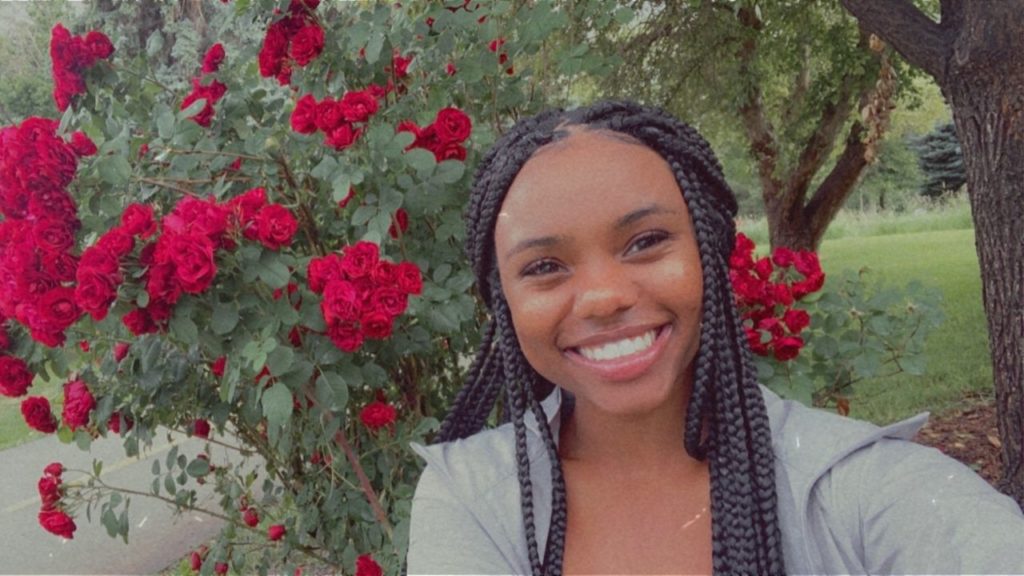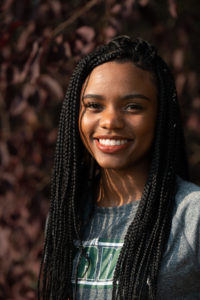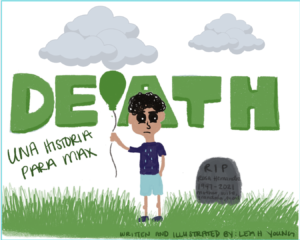
Recognized as an outstanding graduate of Colorado State University’s Department of Human Development and Family Studies, Leah Young has made the most of her undergraduate experience. From academics and involvement to diversity, equity, and inclusion, her dedication and success spans the full spectrum.
In addition to being named an outstanding graduate, young also received the Undergraduate Student Excellence in Diversity, Equity, and Inclusion Award from the College of Health and Human Sciences in April and a graduate school award in May from CSU’s Celebrate Undergraduate Research and Creativity event.
“In my more than twenty years as educator and student affairs professional, she is among the top students I have known,” said Katie Ditter, director of undergraduate advising for the department, undergraduate adviser to Young, and head of the HDFS Peer Mentoring Program, which Young served as a mentor for.
Concentrating on academics and mental health amid challenging times
Pursuing a degree in HDFS with a pre-health concentration, Young is graduating in the Honors Program with a 3.6 GPA. Her studies center around understanding individual development across the lifespan and factors (biological, social, and emotional) that impact development within the context of one’s family, community, and culture.
More specifically, Young became interested in possibly pursuing mental health counseling or therapy in her future career, a passion discovered after taking an adulthood and aging class examining mental health in older adults. Young explained that the class led her to examine her own mental health challenges and those of her family members.
“I want to support others who struggle with mental health issues,” said Young. “Especially in marginalized communities where there is still a strong stigma about counseling and seeking help.”
When the pandemic began in March 2020, she, along with many others, had to adjust to a new normal, including navigating her own mental health in addition to academics and her many involvements.
“I struggled to find my pace as online courses didn’t really suit my learning styles,” said Young. “However, I eventually learned to adjust and be patient with myself in my school and work roles…I also struggle with depression and anxiety, which made getting my education much more difficult but is something I have grown to understand and cope with.”
Amidst the pandemic and mental health challenges, Young remained dedicated, involved, and driven.
“My academic experiences revealed what the purpose of receiving a secondary education was for me,” said Young. “I think in gaining that understanding with the necessary guidance and support from advisers, mentors, and professors, I could better navigate this world feeling more prepared and equipped to do so. Without being able to do things such as email my adviser almost 24/7 or not having meaningful conversations with my Key mentor my first year, I wouldn’t have been able to get through and feel worthy enough to take on the next feat in my life.”
Bringing diversity, equity, and inclusion to the forefront

“I have personally dealt with being a woman of color on a predominantly white institution—especially at an institution where racial injustices occurred to many like myself during all of my four years here,” said Young. “I am also the oldest in my family, which was the major precedent in my life and the reason I’ve worked so hard.”
Young is a first-generation, low-income, self-supporting student. She participated in the Key Explore Community during her first year at CSU and the Academic Advancement Center during her second year. Both organizations provide opportunities for students to interact with others from diverse backgrounds, learning about inclusivity and about the unique experiences of everyone.
“I found that people in my classes, labs, and other areas of the community all have experiences that are fundamental to who they are,” said Young.
After her first year, Young dove into mentorship and involvement to support diversity, equity, and inclusion by serving as a Key Community mentor and being selected for the HDFS Peer Mentoring Program. The Peer Mentoring Program consists of older students who mentor first-year HDFS students, both identifying with a marginalized population. Mentors provide helpful resources, assist in a successful transition from high school to college, lead class discussions, and facilitate team building activities related to identity and resilience.
“Leah engages with, supports, commits to, and serves in programs for people of various backgrounds, abilities, ages, identities, and color,” said Ditter. “She embodies and strives to promote qualities of diversity, equity, and inclusivity inherent in CSU’s mission.”
Young also promotes diversity, equity, and inclusion by getting involved in other areas of the community whether that be her teacher assistant position for Associate Professor Lisa Daunhauer’s cognitive and language development course, exploring challenges and disabilities related to cognition and speech; serving as the alumni chair for the Sigma Lambda Gamma sorority, a philanthropic organization focused on academic achievement and service; volunteering at the Poudre Valley Health & Family Center; or participating in events with organizations such as the Black African American Cultural Center and United Women of Color. On top of academics, organization involvement and internships, Young works for University Housing as a community coordinator.
“As long as I have known Leah, she has had to balance academics, involvement, and her desire to support others, with significant financial pressures,” said Ditter.
Graduating and starting a new chapter

For her honors thesis, Young created a children’s book, which covers death and end-of-life in a developmentally appropriate context, geared toward children of color. Currently, there are few books dealing with this topic where children of color see their identities and communities depicted. Young will also complete her internship working with the counseling staff at a racially diverse high school in Aurora.
“I’ve gained a deeper appreciation for the many cultures and identities that exist,” said Young. “I’ve learned that everyone wants to live in a world where their experience is valid and accepted. These experiences all contribute to my desire to be the best human services provider possible.”
After graduation, Young will take a gap year to explore her interests, including a love for music, and gain additional experience in her field, specifically non-profits. With her grandma, gospel singer Hazel Miller, she will look to her to explore options here in Colorado and beyond.
“I will miss being at CSU and enjoying the beautiful parts of Colorado that are exposed on every inch of this campus,” said Young. “It feels as though I could still get lost on a campus I’ve become very familiar with—and that is what I will miss most.”
Young was on the cover of the university’s Winter 2021 edition of STATE magazine. She was one of three CSU students to share their story on the impact of the Colorado Tuition Grant. This grant covers 50 to 100 percent of a student’s tuition.
“Being a first-generation student and a woman of color; becoming a peer mentor; and being on the cover of State magazine – these are some of my biggest accomplishments at CSU,” said Young.
The Department of Human Development and Family Studies is part of CSU’s College of Health and Human Sciences.